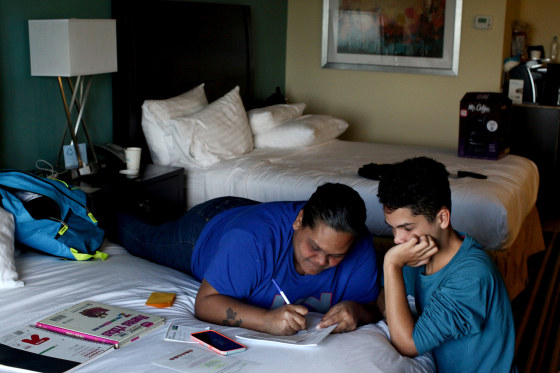WASHINGTON — As Hurricane Florence begins to lash the Carolinas, FEMA officials are about to boot nearly 1,000 American families from the hotel rooms around the country where they've lived since fleeing from the devastation of a different hurricane a year ago.
FEMA has told 987 Puerto Rican families who left their island after Hurricane Maria that check-out time is noon on Friday. The federal government will no longer pay for their rooms.
"I have roughly 48 hours to figure it out. What am I going to do?" said Vimarie Cardona on Wednesday. A single mother, she's been living in an Orlando hotel with her three children since November and now works as a housekeeper at Disney World. "I started looking for apartments. Even before they said [the hotel payments] would end I started looking. From day one it was hell."
Cardona said she can't afford a two-bedroom apartment and landlords are telling her they are not allowed to rent a one-bedroom apartment to a family of four.
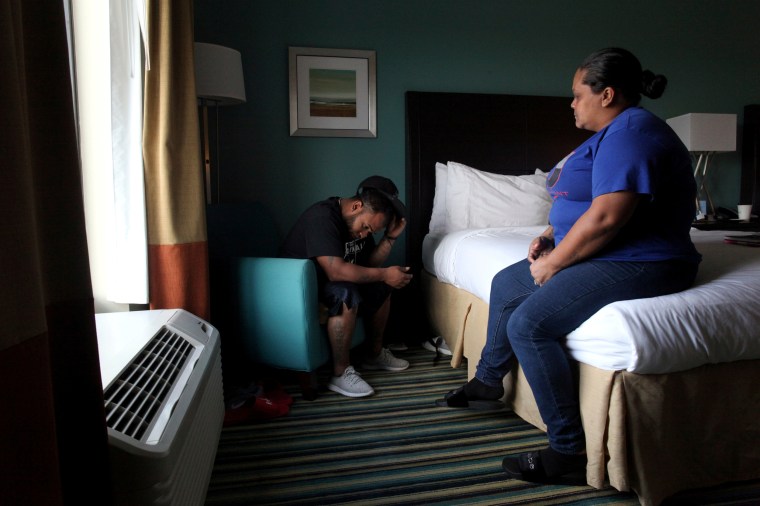
Lenisha Smith, a FEMA spokesperson based in Puerto Rico, told NBC News, "The hurricane was almost a year ago. This is not a long-term program, it's supposed to be temporary."
Hurricane Maria hit Puerto Rico on Sept. 20, 2017, causing an estimated $90 billion in damage, destroying the power grid and leaving most residents without drinking water. As many as 3,000 deaths were linked to the storm by public health experts, and 130,000 people, about 4 percent of the population, left the island because of Maria and her aftereffects.
President Donald Trump told reporters earlier this week that the federal government's response to Maria had been "an incredible, unsung success," and on Thursday morning tweeted that the death toll of 3,000 was a fabrication by Democrats "in order to make me look as bad as possible." Republican officials in Florida, where many Puerto Ricans moved after Maria, quickly repudiated his comments.
Natasha Lycia Ora Bannan, associate counsel with the advocacy group Latino Justice PRLDEF, said Cardona and others like her are facing imminent homelessness. "I have been getting calls and messages all day long from people saying, 'I am terrified of what will happen.'"
Earlier this summer Latino Justice filed a lawsuit against FEMA on behalf of the families asking that the assistance to the families be extended.
There were a few extensions, but on Aug. 30, Judge Timothy Hillman denied the request for a preliminary injunction to stop the evictions. Even though the judge ruled against the families, saying he could not compel FEMA to act, he conceded the families "do not appear to have any place to go once the [FEMA] program ends." The judge agreed with the families that they had suffered "disproportionate hardship" and "may well be rendered homeless."
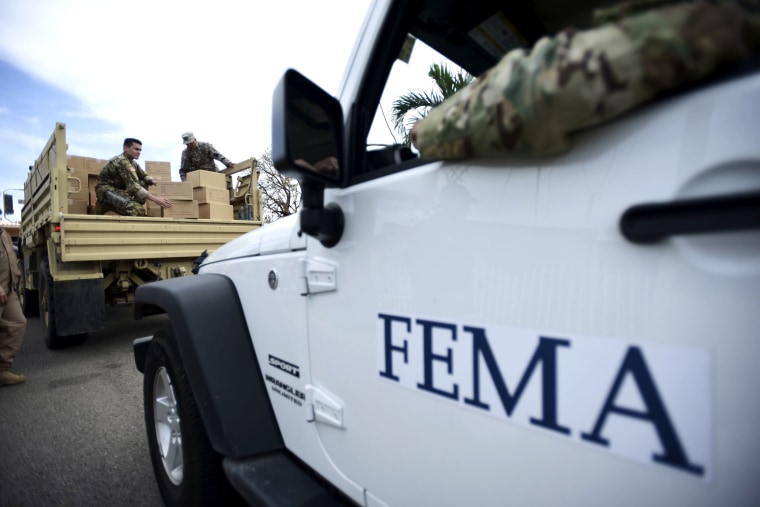
FEMA has presented the families with a list of options.
Families are eligible for a one-way plane ticket back to Puerto Rico, where FEMA says they can access housing services. But like the hotel payments, that ticket offer expires Friday, according to FEMA.
FEMA is also encouraging families to call a government hotline, 1-800-621-3362, when they check out of their hotels. FEMA says families can find out if they are eligible for further rental assistance. The rental assistance is based on fair market rents in Puerto Rico, not in the continental U.S.
"FEMA supports disaster survivors in their recovery process with many different housing programs, and we provide survivors all assistance that they are eligible for under the Stafford Act," a FEMA spokesperson said in an email statement.
Lorena Alecia, 31, has been living with her husband and three daughters in an Ohio hotel since March. She lost her home in Puerto Rico. She told NBC News she only found out the family had to check out by Friday because she heard it on the news. Now she says she's in a state of panic scrambling for a place to live.
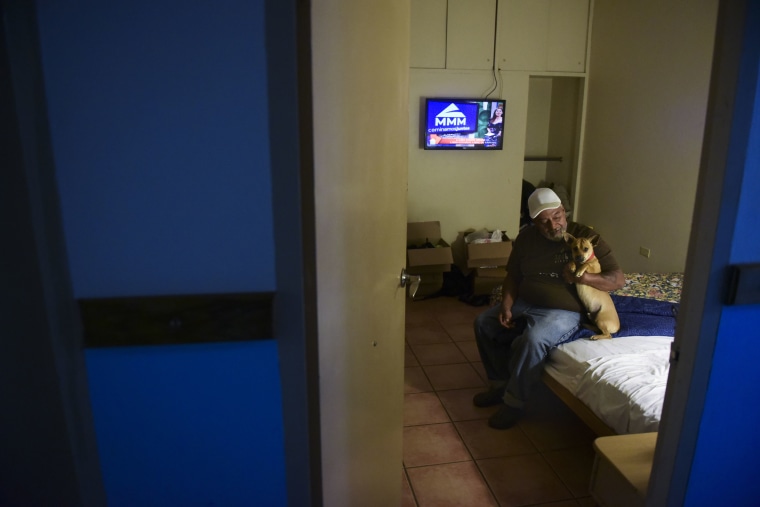
Liz Cruz, 35 who came to New York City in early December from Puerto Rico with her husband and three teenagers, said that after 10 months, "I'm still struggling here."
Initially, said Cruz, she and her family were living in a hotel paid for by FEMA, but now they are in a homeless shelter.
Cruz said when her daughter heard the news of Hurricane Florence's impending landfall she had flashbacks of Puerto Rico and began to cry. "She's worried something bad will happen here," Cruz said.
The Maria evacuees and the non-profits that have been helping them say FEMA has provided many services for victims of other storms but has not extended those same services to Puerto Ricans.
"After other past disasters, longer-term disaster housing assistance has been used to help survivors get back on their feet," said Diane Yentel, president of the National Low Income Housing Coalition, "It's not too late for FEMA to do so now. The last thing the federal government should be doing is knowingly causing homelessness for disaster survivors."
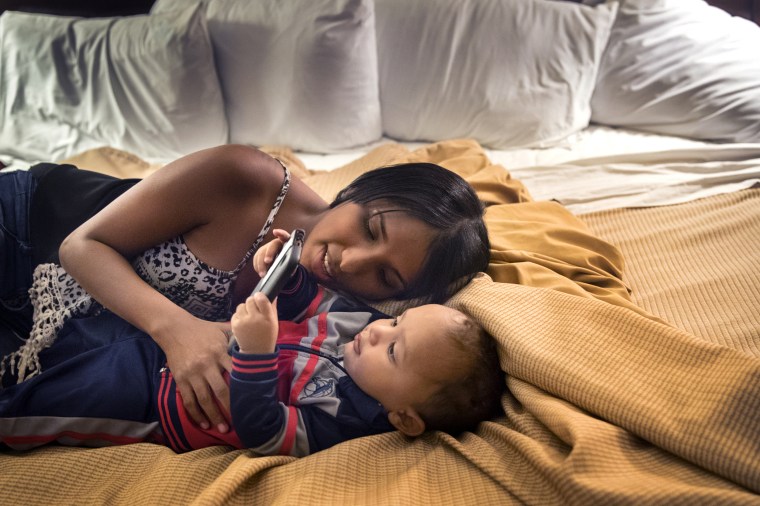
One FEMA program, the Disaster Housing Assistance Program, gives victims housing assistance wherever it's needed — not just where the storm hit — but that program was not activated by FEMA for Hurricane Maria, according to the agency. FEMA says "there is no need" to implement the program because the agency pays full rent for families if they go back to Puerto Rico.
Pastor Jose Rodriguez from Iglesia Episcopal Jesus de Nazaret in Orlando Florida said his congregation has helped thousands of Maria evacuees in Kissimmee, and is now helping 44 families facing eviction. He said the families that have not yet found permanent housing are difficult cases that should be handled by the government. "In a day or two," he said, "the people will be trickling out into the streets."
Some non-profit groups have paid security deposits for the families, according to Rosy Ward with The Heart of Florida United Way in Central Florida, but she says many families still can't afford it. "It's no use for us to help them with deposits if they can't pay their own rents and rents here are very high."
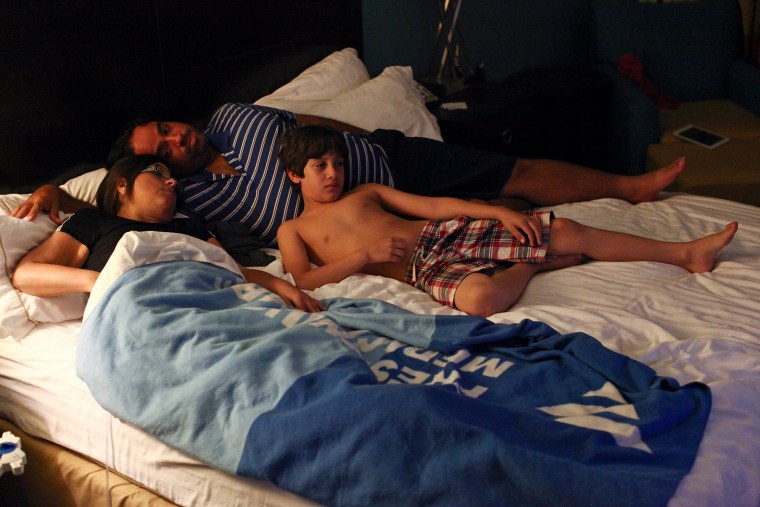
Ward says vouchers from the local housing authority are not an option since wait lists are long, "Oh my God, they can be there for years," she said.
Advocates asked Florida Gov. Rick Scott's office for help. His office told NBC News that while he cannot compel FEMA to act, a spokesperson said, "The state will contact each of these families to ensure they are being connected to the appropriate services."
Cardona, the single mother of three in Florida, said she visited an $1,150 per month two-bedroom apartment Wednesday afternoon. "If I could afford that I wouldn't even be at the hotel, I can't go past my budget" she said.
"Let me contribute here, don't hold me back — just give me a little push," she said.
